The automotive sunroof control unit market is estimated to be valued at USD 3.2 billion in 2025 and is projected to reach USD 7.7 billion by 2035, registering a compound annual growth rate (CAGR) of 9.3% over the forecast period.
The automotive sunroof control unit market is valued at USD 3.2 billion in 2025 and is projected to reach USD 7.7 billion by 2035, growing at a CAGR of 9.3%. The market’s inflection point mapping highlights key phases where growth accelerates due to technological advancements and increasing consumer demand for premium vehicle features. From 2021 to 2025, the market grows from USD 2.0 billion to 3.2 billion, passing through intermediate values of USD 2.2 billion, 2.4 billion, and 2.7 billion.
This initial phase reflects steady growth driven by the rising adoption of sunroofs in mid-range and high-end vehicles. Consumer demand for premium in-vehicle experiences, such as panoramic sunroofs and better air circulation, begins to rise in developed markets. Between 2026 and 2030, the market accelerates, growing from USD 3.2 billion to 5.4 billion, with intermediate values of USD 3.5 billion, 3.8 billion, and 4.1 billion.
This period marks the inflection point as automakers increasingly integrate advanced sunroof control units with smart and automated features like electronic tilt and slide, and sensors for safety. The rapid adoption in electric vehicles (EVs) and luxury car segments further fuels growth. From 2031 to 2035, the market continues to rise from USD 5.9 billion to 7.7 billion, driven by both volume and technological innovations, such as solar-powered and customizable sunroof systems, which expand consumer choices in the automotive industry.
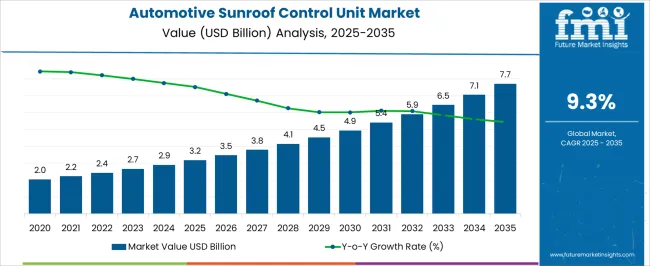
| Metric | Value |
|---|---|
| Automotive Sunroof Control Unit Market Estimated Value in (2025 E) | USD 3.2 billion |
| Automotive Sunroof Control Unit Market Forecast Value in (2035 F) | USD 7.7 billion |
| Forecast CAGR (2025 to 2035) | 9.3% |
The automotive sunroof control unit market is driven by five key parent markets that shape its growth, technological innovation, and demand across the automotive sector. The automotive components market contributes the largest share, approximately 30-35%, as sunroof control units are integral to the vehicle's interior systems, enabling the operation of electric, panoramic, and sliding sunroofs for added comfort and convenience. The automotive electronics market adds around 20-24%, driven by the increasing integration of advanced electronic systems in vehicles, which allows for the control of sunroofs through touchpads, sensors, and smartphone connectivity.
The vehicle comfort and convenience systems market contributes approximately 15-18%, as sunroof control units enhance the driving experience, offering adjustable ventilation and light, improving both aesthetics and interior ambiance. The electric vehicles (EV) market accounts for about 12-15%, as the demand for EVs grows, leading to the incorporation of energy-efficient sunroof control systems that align with the sustainability goals of these vehicles. Finally, the automotive aftermarket market represents about 8-10%, as aftermarket sunroof control units are installed in vehicles, especially for retrofitting or replacing malfunctioning systems, allowing for improved functionality and customization.
The automotive sunroof control unit market is expanding steadily, driven by the rising integration of comfort and luxury features in vehicles across various price segments. Automotive industry updates and OEM announcements have highlighted increased consumer preference for enhanced cabin experiences, with sunroofs becoming a desirable feature in mid-range and premium models. The growth in vehicle electrification and the shift towards SUVs and crossovers have also boosted the adoption of advanced sunroof systems.
Technological improvements in control units, including better sealing, precise positioning, and safety enhancements, have increased reliability and consumer confidence. Moreover, automakers are leveraging panoramic designs and larger glass panels to improve aesthetics and natural lighting inside the cabin, creating stronger demand for high-performance control systems.
With global automotive production recovering and premium feature adoption rising even in emerging markets, the market outlook remains positive. Key growth drivers include panoramic sunroof adoption, higher SUV sales, and continued reliance on conventional SCUs for cost-effective and proven operational performance.
The automotive sunroof control unit market is segmented by sunroof, vehicle, technology, sales channel, and geographic regions. By sunroof, automotive sunroof control unit market is divided into panoramic sunroof, built-in sunroof, tilt-and-slide sunroof, pop-up sunroof, and spoiler sunroof. In terms of vehicle, automotive sunroof control unit market is classified into SUV, sedan, hatchback, and others. Based on technology, automotive sunroof control unit market is segmented into Conventional SCUs and Smart SCUs. By sales channel, automotive sunroof control unit market is segmented into OEM and aftermarket. Regionally, the automotive sunroof control unit industry is classified into North America, Latin America, Western Europe, Eastern Europe, Balkan & Baltic Countries, Russia & Belarus, Central Asia, East Asia, South Asia & Pacific, and the Middle East & Africa.
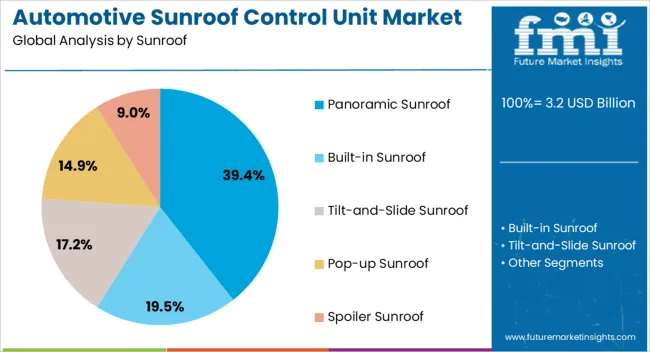
The panoramic sunroof segment is projected to contribute 39.4% of the automotive sunroof control unit market revenue in 2025, reflecting its growing appeal among consumers seeking premium aesthetics and enhanced cabin ambiance. Automotive manufacturers have increasingly offered panoramic designs across both luxury and mid-tier vehicle models to differentiate product offerings and meet lifestyle-oriented demand.
The segment’s expansion has been supported by advances in lightweight materials and structural engineering, allowing for larger glass panels without compromising vehicle safety or performance. Additionally, consumer feedback and market surveys have shown a strong correlation between panoramic sunroofs and higher perceived vehicle value, encouraging OEMs to integrate them as optional or standard features.
As automakers prioritize comfort and design-driven innovation, panoramic sunroofs are expected to continue gaining traction, particularly in SUVs and electric vehicles where cabin space and openness are key selling points.
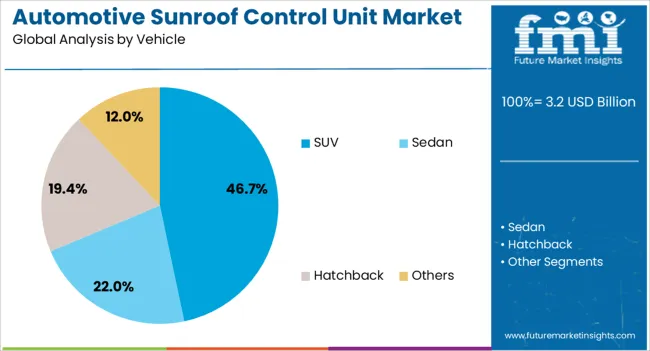
The SUV segment is projected to account for 46.7% of the automotive sunroof control unit market revenue in 2025, maintaining its leadership in vehicle type adoption. This dominance has been fueled by the sustained global demand for SUVs, driven by their versatility, higher seating position, and spacious interiors that complement larger sunroof designs.
Automakers have increasingly positioned SUVs as lifestyle vehicles, integrating advanced comfort features such as panoramic sunroofs to attract buyers in competitive markets. Industry production reports have shown that SUVs represent a significant share of new vehicle launches, particularly in North America, Europe, and Asia-Pacific.
Furthermore, the structural design of SUVs accommodates larger roof openings, enabling more seamless integration of complex sunroof mechanisms. With SUVs continuing to be a preferred choice for both urban and long-distance driving, the segment’s demand for sunroof control units is expected to remain strong.
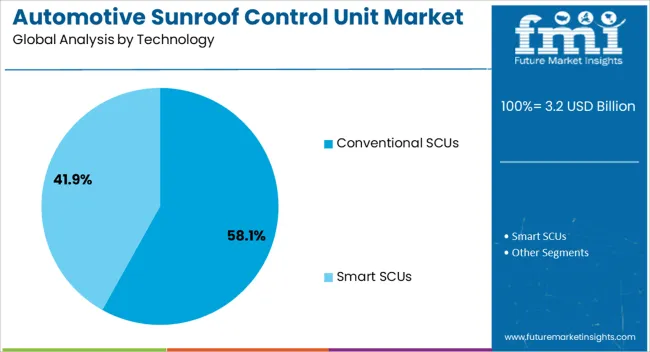
The conventional SCUs segment is projected to hold 58.1% of the automotive sunroof control unit market revenue in 2025, reflecting its continued relevance despite advancements in smart and integrated control systems. Conventional SCUs have retained market dominance due to their proven reliability, lower cost, and ease of integration across a broad range of vehicle models.
Automotive component suppliers have continued refining these units to ensure smoother operation, better sealing, and enhanced durability in diverse climate conditions. Their established supply chains and compatibility with existing vehicle electrical architectures have made them a preferred choice for automakers balancing performance and cost considerations.
Additionally, in price-sensitive markets, conventional SCUs remain the default technology due to their affordability and straightforward maintenance. As long as cost-efficiency and dependability remain key purchasing factors, conventional SCUs are expected to sustain their market share alongside the gradual growth of advanced electronic control solutions.
The automotive sunroof control unit market is growing due to rising demand for advanced vehicle features that enhance comfort, safety, and luxury. Technological advancements such as gesture control, smart sensors, and smartphone integration are driving market growth. Challenges include high production costs, meeting stringent safety standards, and ensuring product reliability. Opportunities lie in the adoption of electric and autonomous vehicles, which demand more sophisticated sunroof systems. Manufacturers focusing on lightweight materials, smart integration, and compliance with safety regulations are well-positioned to capitalize on these emerging trends in the automotive sunroof control unit market.
Sunroof control units are integral to providing ease of operation, including one-touch open/close, anti-pinch mechanisms, and automatic reverse when obstacles are detected. As consumer preference for comfort and convenience grows, especially in premium and mid-range vehicles, automakers are integrating sunroof systems into a wider range of models. This trend is particularly evident in markets like North America, Europe, and Asia-Pacific, where a rising middle class and growing disposable incomes are driving the purchase of vehicles with high-end features, such as panoramic sunroofs. Leading automakers, such as Mercedes-Benz, BMW, and Audi, have increasingly incorporated advanced sunroof systems, enhancing the appeal of their vehicles, while also ensuring that these systems meet safety and performance standards.
In the modern era of connected cars, sunroof control units are evolving with features such as gesture control, voice commands, and smartphone connectivity, allowing for seamless integration with the vehicle’s infotainment system. The incorporation of smart sensors that detect rain, wind, and temperature enables the automatic operation of sunroofs, opening or closing them based on real-time environmental conditions. These technological innovations not only improve user experience but also contribute to overall vehicle performance, ensuring a safer and more enjoyable driving experience.
The integration of sunroof control systems with the vehicle’s climate control systems further enhances energy efficiency and user comfort. As a result, demand for highly sophisticated, technologically advanced sunroof control units is expected to increase among consumers seeking enhanced convenience.
Sunroof control units must be made from high-quality materials that ensure durability and reliability throughout a vehicle’s lifespan, which can be a significant cost driver. Furthermore, consumers and regulatory authorities demand high standards in terms of safety features, such as anti-pinch mechanisms and automatic reverse functionality, to prevent injury or damage. Manufacturers must ensure that their products comply with these safety regulations while also keeping production costs under control to maintain competitiveness. In addition, the pressure to deliver high-performance, reliable systems while adhering to ever-evolving regulations requires constant innovation and investment in research and development. Companies that can strike a balance between performance, cost, and safety are best positioned to thrive in this competitive market.
Electric vehicles (EVs), which offer greater flexibility in vehicle design, are increasingly incorporating advanced sunroof systems to enhance comfort and luxury, creating a new demand for highly sophisticated control units. These vehicles often feature larger panoramic sunroofs, and in some cases, the integration of a sunroof may become a defining feature of the car’s interior design. Additionally, as autonomous vehicles become more prevalent, the need for highly automated sunroof control systems is increasing.
Fully automated sunroof systems controlled by voice commands, gestures, or app-based interfaces are expected to become a key part of the user experience in autonomous vehicles. Manufacturers that specialize in smart, connected sunroof control systems are positioned to benefit as electric and autonomous vehicles gain market share. As vehicle technology evolves, these advanced systems will play a critical role in providing a seamless, luxurious experience for consumers.
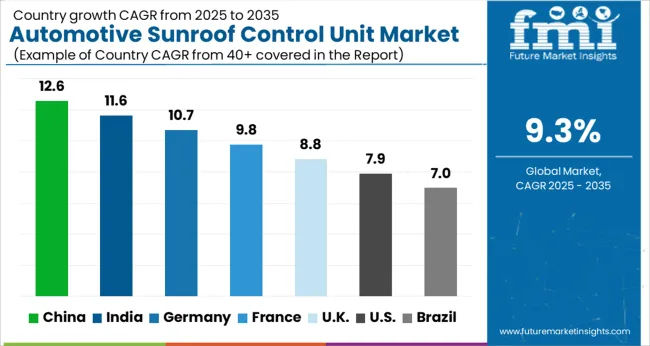
| Country | CAGR |
|---|---|
| China | 12.6% |
| India | 11.6% |
| Germany | 10.7% |
| France | 9.8% |
| UK | 8.8% |
| USA | 7.9% |
| Brazil | 7.0% |
The global automotive sunroof control unit market is projected to grow at a CAGR of 9.3% from 2025 to 2035. China leads the market with a growth rate of 12.6%, followed by India at 11.6%, and Germany at 10.7%. The UK and the USA show more moderate growth at 8.8% and 7.9%, respectively. The market is being driven by the rising demand for luxury and premium vehicles, along with growing adoption of electric and panoramic sunroofs. Key factors include the increasing consumer preference for advanced vehicle features, innovations in automotive design, and the shift toward electric vehicles, particularly in developed markets. The analysis includes over 40+ countries, with the leading markets detailed below.
The automotive sunroof control unit market in China is expected to grow at a CAGR of 12.6% from 2025 to 2035. As one of the largest automotive markets globally, China is witnessing rapid adoption of advanced automotive technologies, including sunroof control units, driven by rising consumer demand for luxury features in vehicles. The increasing preference for panoramic sunroofs and electric sunroof systems in both premium and mass-market vehicles is a significant factor propelling the market’s growth. China’s strong manufacturing base and position as a global hub for automotive production provide a competitive advantage, enabling domestic manufacturers to meet rising demand. The country's expanding automotive industry, fueled by robust sales and technological advancements, further accelerates the adoption of advanced sunroof control systems.
The automotive sunroof control unit market in India is projected to grow at a CAGR of 11.6% from 2025 to 2035. The increasing adoption of premium vehicles, along with rising disposable incomes, is driving the demand for sunroof control units in India. The growing preference for luxury cars equipped with sunroofs, along with rising consumer awareness about advanced automotive features, is fueling market growth. Additionally, the expansion of local manufacturing in India and the increasing presence of international automotive brands further contribute to the growing demand for sunroof control systems. As the Indian automotive market continues to grow, the need for efficient and technologically advanced vehicle features, including sunroof controls, is set to increase.
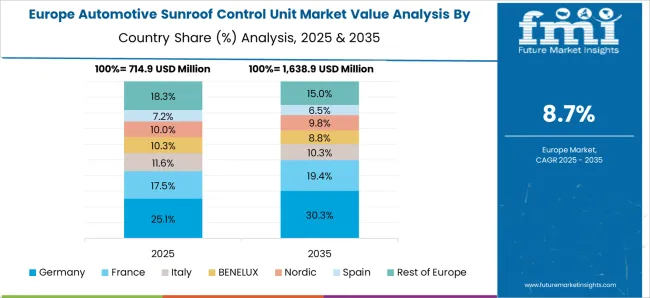
The automotive sunroof control unit market in Germany is projected to grow at a CAGR of 10.7% from 2025 to 2035. Germany, known for its strong automotive manufacturing industry, is a key market for automotive sunroof control units. The demand is driven by the country’s established automotive sector, with an increasing number of vehicles being equipped with panoramic and electric sunroofs. As a hub for premium car manufacturers like BMW, Audi, and Mercedes-Benz, the market is heavily influenced by innovations in automotive features .The growing trend toward electric and eco-friendly vehicles, which often come with advanced features like sunroofs, further supports the demand for sunroof control units.
The UK automotive sunroof control unit market is expected to grow at a CAGR of 8.8% from 2025 to 2035. As consumer demand for advanced automotive features continues to rise, the UK market is seeing increasing adoption of vehicles with sunroof systems, particularly in luxury and high-end car segments. The growing trend of incorporating panoramic and electric sunroofs in vehicles has boosted the demand for efficient sunroof control units. Moreover, the UK’s automotive market is shifting toward electric vehicles (EVs), many of which are equipped with advanced features like sunroofs, further driving the need for specialized control units.
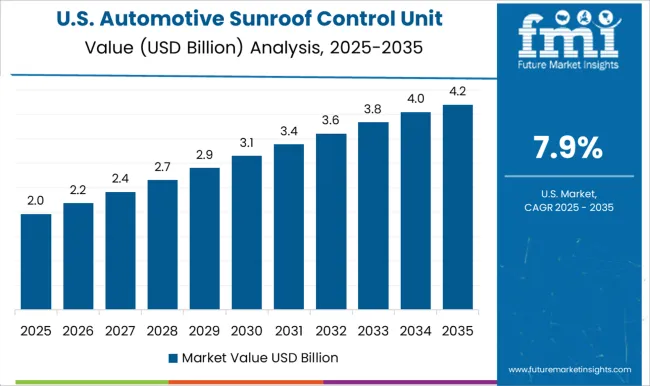
The USA automotive sunroof control unit market is projected to grow at a CAGR of 7.9% from 2025 to 2035. The demand for sunroof control units in the USA is driven by the growing popularity of premium and luxury vehicles, particularly those equipped with panoramic sunroofs. As consumers increasingly prioritize comfort and luxury features in their vehicles, the need for advanced sunroof control systems is expected to rise. Additionally, with the continued expansion of electric vehicles (EVs), which often feature panoramic and solar sunroof systems, the USA market is poised for steady growth. As automakers focus on enhancing vehicle features, the demand for high-quality sunroof control units is projected to increase.
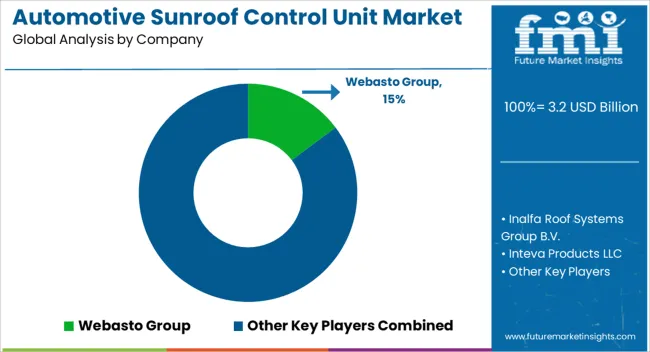
Competition in the automotive sunroof control unit market is driven by technological innovation, integration with advanced vehicle systems, and the ability to enhance the user experience. Webasto Group leads the market with a range of high-quality, user-friendly sunroof control units, offering features like one-touch operation, advanced sensors, and seamless integration with other vehicle control systems. Their product brochures emphasize durability, safety, and convenience, showcasing their ability to provide both manual and automated sunroof solutions for a wide range of automotive applications.
Inalfa Roof Systems Group B.V. competes by providing innovative sunroof control systems that focus on both functionality and style. Their brochures highlight customizable control options, such as smart sensors and motorized operations, allowing drivers to easily adjust the sunroof while enhancing the vehicle’s aesthetic appeal. Inalfa emphasizes its expertise in integrating control systems with modern automotive technologies, ensuring smooth operation and high reliability. Inteva Products LLC stands out with a focus on next-generation automotive sunroof systems, combining safety features, precision control, and efficiency.
Their product brochures highlight advanced control units with innovative mechanisms that allow for precise tilt and slide functions, enhancing driver and passenger convenience. Inteva also emphasizes its commitment to sustainable manufacturing processes, offering eco-friendly sunroof systems that meet global regulations. Yachiyo Industry Co., Ltd. offers high-performance sunroof control units designed for a range of vehicles, from luxury cars to mass-market models. Their brochures focus on ease of installation and maintenance, as well as the ability to provide customizable sunroof solutions that meet the needs of different automotive manufacturers.
AISIN CORPORATION offers sunroof control units known for their reliability and longevity, with brochures highlighting their integration with advanced vehicle electronics for smooth, automated sunroof operation. CIE Automotive S.A., Magna International Inc., and Johnan America Inc. provide competitive solutions that prioritize high-quality manufacturing, precision engineering, and adaptability to different vehicle platforms.
Their product brochures showcase innovative sunroof control units that offer increased functionality, reduced weight, and advanced features like anti-pinch mechanisms. Signature Automotive Products targets niche markets with affordable, high-quality sunroof control units, emphasizing ease of use and durability. Their brochures highlight simple yet effective control options, catering to a wide range of vehicle types.
| Item | Value |
|---|---|
| Quantitative Units | USD 3.2 billion |
| Sunroof | Panoramic Sunroof, Built-in Sunroof, Tilt-and-Slide Sunroof, Pop-up Sunroof, and Spoiler Sunroof |
| Vehicle | SUV, Sedan, Hatchback, and Others |
| Technology | Conventional SCUs and Smart SCUs |
| Sales Channel | OEM and Aftermarket |
| Regions Covered | North America, Europe, Asia-Pacific, Latin America, Middle East & Africa |
| Country Covered | United States, Canada, Germany, France, United Kingdom, China, Japan, India, Brazil, South Africa |
| Key Companies Profiled | Webasto Group, Inalfa Roof Systems Group B.V., Inteva Products LLC, Yachiyo Industry Co., Ltd., AISIN CORPORATION, CIE Automotive S.A., Magna International Inc., Johnan America Inc., and Signature Automotive Products |
| Additional Attributes | Dollar sales by product type, application, and control features are growing, driven by rising demand for sunroof-equipped vehicles and advanced features. Strong regional growth is seen in North America, Europe, and Asia-Pacific. |
The global automotive sunroof control unit market is estimated to be valued at USD 3.2 billion in 2025.
The market size for the automotive sunroof control unit market is projected to reach USD 7.7 billion by 2035.
The automotive sunroof control unit market is expected to grow at a 9.3% CAGR between 2025 and 2035.
The key product types in automotive sunroof control unit market are panoramic sunroof, built-in sunroof, tilt-and-slide sunroof, pop-up sunroof and spoiler sunroof.
In terms of vehicle, suv segment to command 46.7% share in the automotive sunroof control unit market in 2025.






Full Research Suite comprises of:
Market outlook & trends analysis
Interviews & case studies
Strategic recommendations
Vendor profiles & capabilities analysis
5-year forecasts
8 regions and 60+ country-level data splits
Market segment data splits
12 months of continuous data updates
DELIVERED AS:
PDF EXCEL ONLINE
Automotive Performance Part Market Size and Share Forecast Outlook 2025 to 2035
Automotive Carbon Ceramic Brake Market Size and Share Forecast Outlook 2025 to 2035
Automotive Camshaft Market Size and Share Forecast Outlook 2025 to 2035
Automotive Stamping Industry Analysis in India Size and Share Forecast Outlook 2025 to 2035
Automotive Cylinder Liner Market Size and Share Forecast Outlook 2025 to 2035
Automotive Roof Rails Market Size and Share Forecast Outlook 2025 to 2035
Automotive Active Safety System Market Size and Share Forecast Outlook 2025 to 2035
Automotive Diagnostic Scan Tool Market Size and Share Forecast Outlook 2025 to 2035
Automotive Test Equipment Market Size and Share Forecast Outlook 2025 to 2035
Automotive Dynamic Map Data Market Size and Share Forecast Outlook 2025 to 2035
Automotive Green Tires Market Size and Share Forecast Outlook 2025 to 2035
Automotive E-Tailing Market Size and Share Forecast Outlook 2025 to 2035
Automotive Interior Market Forecast Outlook 2025 to 2035
Automotive Key Market Size and Share Forecast Outlook 2025 to 2035
Automotive Appearance Chemical Market Forecast and Outlook 2025 to 2035
Automotive Seating Market Forecast and Outlook 2025 to 2035
Automotive Remote Diagnostic Market Forecast and Outlook 2025 to 2035
Automotive-grade Inertial Navigation System Market Size and Share Forecast Outlook 2025 to 2035
Automotive Thin IGBT Module Market Size and Share Forecast Outlook 2025 to 2035
Automotive Hydrogen Leak Detection Sensors Market Size and Share Forecast Outlook 2025 to 2035

Thank you!
You will receive an email from our Business Development Manager. Please be sure to check your SPAM/JUNK folder too.
Chat With
MaRIA